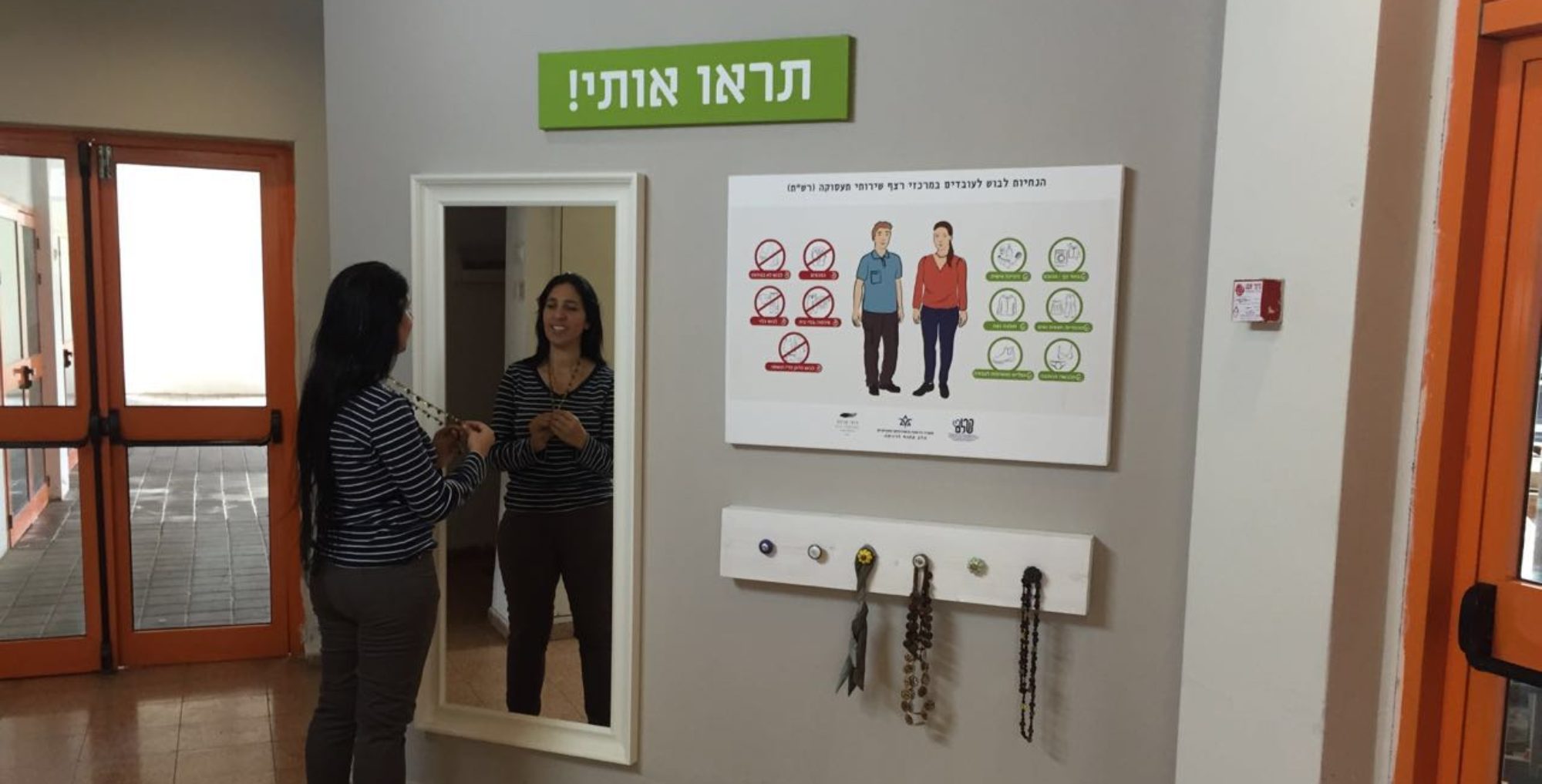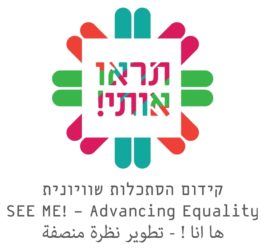About SEE ME! Program
The “See Me!” program aims to improve self-image, self-efficacy and independence among its participants by working to advance personal appearance, including hygiene, grooming and attire. Over the course of the program, participants become acquainted with the ability to generate positive change in their lives through various personal growth processes involving choice, responsibility, self-advocacy, goal definition and fulfillment, success, increased awareness, self-direction and more. The program was established by the Shalem Foundation and Ruti Treves, in collaboration with the Intellectual and Developmental Disabilities (IDD) Wing of the Israeli Ministry of Labor, Social Affairs and Social Services and various local municipalities. While currently being implemented in housing facilities for individuals with IDD, “See Me!” can benefit a wide range
A movie clip describing the program and additional references in the media can be found on the official See Me website: www.seemeprogram.com
Program Vision and Goals
Vision: To increase awareness about personal appearance among people with intellectual and development disability (IDD) and the professional teams that work with them.
Specific goals associated with this vision are:
- To advance the perception of people with IDD as equals, while minimizing the obstacles faced by members of this community, encouraging their inclusion and integrating them in everyday social and occupational circles.
- To improve self-esteem and self-efficacy among program participants by providing knowledge, practical skills and language; to increase self-direction and self-advocacy in the field of personal appearance and, consequently, to facilitate growth in other life areas.
- To improve personal appearance among program participants in accordance with objective measures related to attire, hygiene and grooming.
- To generate change in the way professional teams and families perceive the topic of personal appearance in the IDD community, and therefore in the way they perceive the program participants themselves. To create an enabling environment in which personal appearance is seen as a legitimate and relevant tool for advancing and meeting the needs of program participants.
- To advance the professional development and empowerment of the professional teams. To unify team members and create collaborations with the teams of complementary service providers (housing/recreational/vocational). To provide team members with practical tools and techniques for advancing and guiding program participants.
Participant Testimonials
- Ayelet Fishbein – Manager, Shekel Vocational Rehabilitation and Training Center, Jerusalem. “The program is so successful. An entire emotional world has been revealed through this topic, which we continue to leverage and use to advance the employees. The counselors speak the language; the employees speak the language; it is very important that the language has been made accessible to us all and that the instructional toolbox is in use. We had a diverse group of employees, reflecting the Center’s diversity – someone blind, someone on a wheelchair, Jews and Arabs – .”
- Rotem Seftal – Manager, Vocational Rehabilitation and Training Center, Ashdod. “You can really see the effects on internal feelings… how the participants feel about themselves. Their body language has changed; they stand taller. I was surprised by the strength of parent responses at the joint meeting with parents at the housing facility. in that way made me understand that it’s really important to them.”
- Mor Togendreich – Manager, Vocational Rehabilitation and Training Center, Or Yehuda. “There has been no workshop, in all my years here, and when I still worked at ‘Aleh,’ that generated such a change and such responses. Ruti made the difference; she is the added value of the program. The approach, the connection, the treatment of all as equals, the creativity and the tools that we received and that remain in our facility – all these are Ruti. You can see that we have undergone a dramatic change, both in the response of the hostels and among the parents.”
- Linoy Levy – Social Worker, Vocational Rehabilitation and Training Center, Rehovot. “Today, with Ruti’s help, we know what language to use, how to approach people in a respectful way, how to empower participants through this topic, and how to use it to improve their feelings of self-efficacy.”
- Naomi – Counselor, Shekel Vocational Rehabilitation and Training Center, Jerusalem. “We participated in the ‘See Me!’ program in recent weeks. It is really really needed; the participants learned so so so much, and understood more with every meeting. I think it is important for every care facility or center to participate in this activity, for themselves. A few people really shared their difficulties; there was one, for example, that shared how hard it was for him to shower, which created a conversation about how he could cope, why it was hard, how he could shower and what happens to our bodies when we don’t shower. There are examples of participants that changed the way they dress for work. People who usually showed up in sweats. They truly discovered the attire that gives them respect.”
- Sully L. – Participant, Vocational Rehabilitation and Training Center, Kiryat Gat. “My life changed from top to bottom. Since participating in the workshop, I have a girlfriend, and this week I passed the interview and will start working at Intel in logistics and maintenance.”
- Rita M. – Participant, Vocational Rehabilitation and Training Center, Ashdod. “We made changes. How to dress, how to shower, how to change clothes, to come to work, not too long and not too short. For me this is now really important for a good calm feeling, and I use deodorant and everything, and now friends don’t stay away from me. I have a boyfriend and I have fun at the Center.”
- Oded R. – Participant, Vocational Rehabilitation and Training Center, Rehovot. “It was interesting; it was fun. I learned to use deodorant, to brush my teeth. I looked in the mirror and saw how I dressed nicely.”
About The Shalem Foundation
The Shalem Foundation is dedicated to utilizing the potential of every person with intellectual disabilities in order to provide them with the best possible quality of life as well as educating society as a whole to be more inclusive and caring.
The Shalem Foundation was established in 1983 by the Federation of Local Authorities in cooperation with the Ministry of Social Affairs and Social Services. The foundation works to develop comprehensive services and resources for people with intellectual and developmental disabilities throughout Israel.
About Ruti Treves
Ruti Treves (LL.B. and B.A. Economics, Tel Aviv University; certified attorney)
Ruti provides consulting services and workshops in the field of personal image and branding, specializing in professional appearance and attire among individuals with special needs. She developed and now manages the “See Me!” program, in collaboration with the Shalem Fund and the Israeli Ministry of Labor, Social Affairs and Social Services, which aims to increase awareness about personal appearance among individuals with intellectual and developmental disabilities at vocational rehabilitation and training centers.
Ruti is a recognized speaker on this topic at the Israeli Federation of Local Authorities, the Israel Association of Community Centers, Beit Issie Shapiro, the Willie & Celia Trump Campus, and other organizations. She is the founder of “Dress for Success” Tel Aviv, an NPO that works to advance the entry of women into the workforce. In addition, she is a publicist specializing in the area of personal appearance in the workplace, and writes columns for The Market and “At” magazines.

